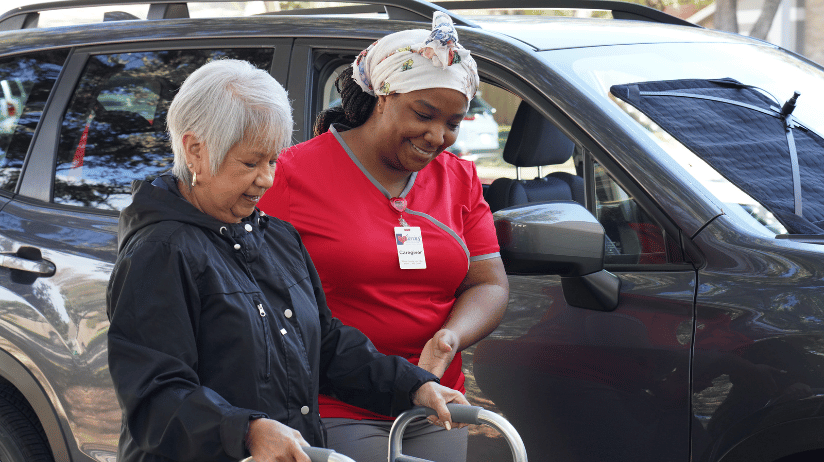In our fast-paced and digital world, it's easy to overlook the value of a individualized care. Some senior care companies are deploying robots and other technology to care for seniors at scale. Others are scaling back services and adjusting their care model to meet the growing demand for services. However, there is profound power in one-on-one senior care.
Traditional Care Models
Traditional models of senior care include nursing homes or assisted living facilities. These models rely on group care, with seniors living under the same roof. With a single care facility, companies can curb costs through centralization. Staff can easily meet the basic needs of multiple seniors at one time.
These senior care settings can be beneficial for seniors. For example, seniors with chronic conditions may need the constant watchful eye of doctors. But they were not designed for one-on-one interaction.
These traditional care models fall short in providing the personalized attention and nurturing environment that seniors crave. Facilities are often understaffed, and the care team working may feel burned out and worn down as they rush from patient to patient.
One-on-One Care
One-on-one senior care offers a deeply personal and tailored experience that can make all the difference. At it's core, one-on-one senior care is about building meaningful connections. It's about forging bonds of trust and understanding between caregivers and their elderly clients.
In institutional settings where residents may feel like just another number. But one-on-one care puts the focus squarely on the individual. Seniors can receive the undivided attention and support they deserve.
This type of care can actually take place within a nursing home or assisted living facility. But most commonly, we see one-on-one care services provided by caregivers in a senior's home. Home care allows seniors to continue to live comfortably at home, while getting the personalized care they need.
Benefits of One-on-One Senior Care
When considering long-term care options, it's important to weight the benefits and drawbacks of all the options. Here are some of the benefits of one-on-one care that can lead to better health outcomes.
Independence
One of the most significant benefits of one-on-one senior care is its ability to promote autonomy. For many seniors, maintaining a sense of control over their lives is paramount to their well-being. By providing assistance on a one-on-one basis, caregivers empower seniors to remain active participants in their own lives.
Caregivers can help seniors with daily tasks, facilitate social interactions, or simply offer a listening ear. One-on-one care fosters a sense of agency that is invaluable in preserving dignity and self-respect.
RELATED CONTENT: 7 Reasons Why Independence Is Important for Seniors
Patient-Centered Approach
Furthermore, one-on-one senior care allows for a truly individualized patient care. Each senior has their own unique set of needs, preferences, and challenges. One-on-one caregivers are able to tailor their support accordingly. From medication management to meal preparation, caregivers work hand in hand with seniors to create a care plan that addresses their specific concerns and promotes overall well-being.
Emotional Support
One-on-one senior care also offers emotional and psychological benefits. Many seniors face feelings of loneliness, isolation, and depression, particularly as they age and their social circles diminish. Caregivers can provide companionship, emotional support, and a sense of belonging — all of which significantly improve the quality of life of their clients. Whether it's sharing stories, playing games, or enjoying each other's company, these meaningful interactions help nurture the soul.
RELATED CONTENT: Ways to Address the Emotional Needs of Seniors
Peace of Mind
Additionally, one-on-one senior care offers peace of mind for families. Entrusting the care of a loved one to a stranger can be a daunting prospect. However, caregivers often become like extended family members, forming deep bonds with their clients and providing reassurance to concerned families. Families can rest easy knowing their loved one is receiving individualized attention in the comfort of their own home.
Affording One-on-One Care
One might argue that one-on-one senior care is a luxury that only the wealthy can afford. However, this type of care may be more affordable than you think.
Professional caregivers often provide their quality care services at an hourly rate. So, instead of paying for a flat monthly rate, families can create a tailored schedule for their loved one. They could hire a caregiver anywhere from a few hours a week to around the clock. This allows for flexibility in scheduling and can make it more affordable.
In the long run, one-on-one care can actually lead to cost savings by reducing hospitalizations, emergency room visits, and other expensive medical interventions. Keeping older adults out of the healthcare systems and in their own homes can improve their well-being and help save money.
There are also programs available that can help cover the costs of one-on-one home care. For example, some long-term care insurance policies and VA programs can help.
But the benefits of this personalized approach extend far beyond mere financial considerations. The health of your loved one is the most important. One-on-one senior care is not just about meeting basic needs—it's about enriching lives and nurturing the spirit. It's about recognizing the inherent worth and dignity of every individual, regardless of age or ability.
In a world that often prioritizes efficiency above all else, one-on-one senior care serves as a powerful reminder of the importance of compassion, connection, and human touch. To learn more about getting one-on-one care for your loved one, contact your local Caring team today.

